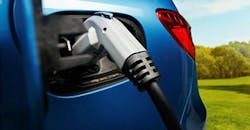European Alliance to Invest $6.7 Billion in Electric Car Batteries
European governments and companies will form an alliance for developing next-generation batteries for electric vehicles, investing five to six billion euros (US$6.7 billion) in the project, the French and German finance ministers said on May 2.
France's Bruno Le Maire said a maximum of 1.2 billion euros in public subsidies would be granted to the alliance, at a press conference with his German counterpart Peter Altmaier.
"Other member states have already expressed interest in joining this project," Le Maire said, including Italy, Belgium, Poland, Austria and Finland.
He said at least four billion euros would come from private companies, citing automaker PSA and the French battery maker Saft, a unit of French oil giant Total.
"Today we are seeing more interest than ever" in the project, Altmaier said, adding that 35 companies had already pledged to sign up, including Europe's biggest automakers.
Political leaders across the European Union have long called for a coordinated effort for home-made batteries that would free carmakers from having to rely on Chinese batteries as the industry shifts away from combustion engines.
A pilot factory with around 200 employees will be opened in the coming months in France, with a goal of opening two production sites, in France and Germany, that would generate 1,500 jobs at each.
European automakers have been ramping up electric vehicle production after years of scandals over diesel pollution and as tougher rules on cutting carbon emissions come into force.
But EU carmakers buy cells from foreign manufacturers, mostly in Asia, which they use to build the high-capacity batteries needed to power electric vehicles.
Germany and France, in particular, have been pushing for a pan-European consortium to develop new battery technologies that would be built domestically, along the lines of the European aircraft manufacturer Airbus.
Copyright Agence France-Presse, 2019
About the Author
Agence France-Presse
Copyright Agence France-Presse, 2002-2025. AFP text, photos, graphics and logos shall not be reproduced, published, broadcast, rewritten for broadcast or publication or redistributed directly or indirectly in any medium. AFP shall not be held liable for any delays, inaccuracies, errors or omissions in any AFP content, or for any actions taken in consequence.
